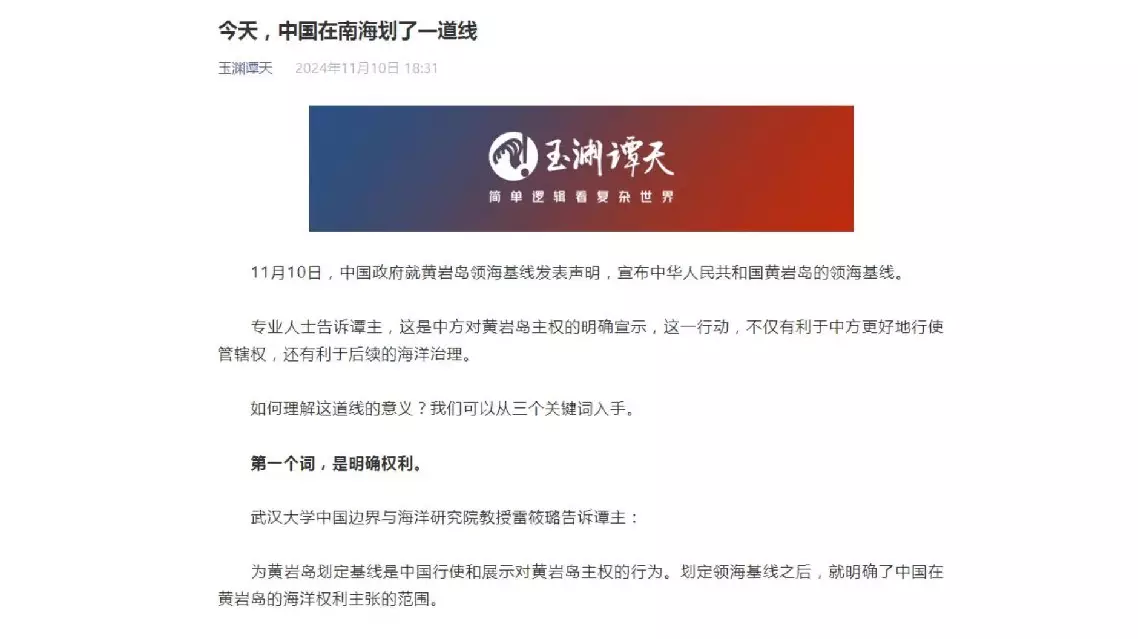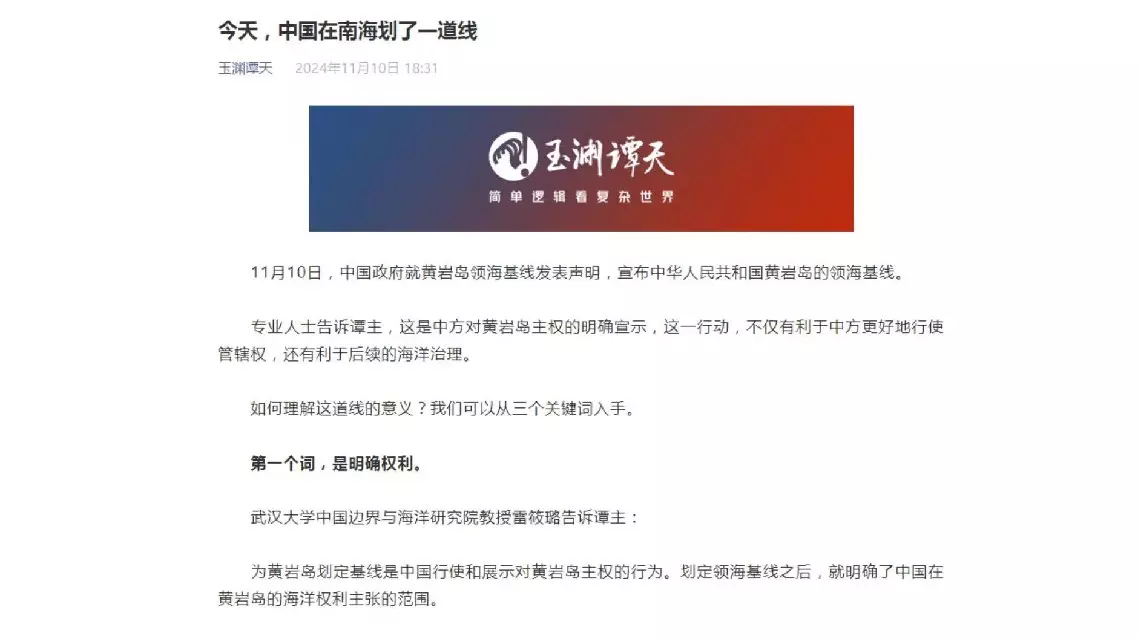The Chinese government issued a statement on Sunday releasing the baselines and base points of the territorial sea adjacent to Huangyan Dao, which is a move to better safeguard its sovereignty and legitimate maritime rights and interests, said a China Media Group (CMG) commentary on Sunday, citing expert opinions.
An edited English-language version of the commentary is as follows:
Lei Xiaolu, a professor at the China Institute of Boundary and Ocean Studies of Wuhan University, said demarcating the baselines is an act by China to exercise and demonstrate its sovereignty over the island. Once the baselines are defined, they clarify the scope of China's maritime claims around Huangyan Dao.
According to the United Nations Convention on the Law of the Sea, maritime areas include internal waters, territorial seas, contiguous zones, exclusive economic zones (EEZ) and continental shelves. The boundaries and scope of these areas are all related to the territorial sea baselines.
In other words, the territorial sea baselines are the connection point and bridge between sovereignty and maritime rights.
Lei said the delineation of the territorial sea baselines, together with the "Law on the Territorial Sea and the Contiguous Zone of the People's Republic of China", the "Law on the Exclusive Economic Zone and Continental Shelf of the People's Republic of China" and other legal documents, will make China's maritime rights and claims in the waters around Huangyan Dao clearer.
This will help clarify the rights and obligations of all countries in relevant waters, and make China's law enforcement and jurisdiction activities in these waters more transparent, she said.
In 1996, China published the baselines for most of its maritime regions.
In the years that followed, other regions' baselines were added, such as the baselines for Diaoyu Dao and its affiliated islets in 2012. This year, China announced the northern territorial sea baselines for the Beibu Gulf, filling the gap in the baselines of the westernmost territorial waters of China's mainland.
The baselines of the territorial sea adjacent to Huangyan Dao were not drawn recently. The reason why they were not announced earlier is that China has consistently adopted a rational, restrained and responsible approach in handling maritime issues in the surrounding areas.
To maintain peace and stability in the South China Sea and prevent disputes from escalating or becoming more complicated, China has always remained cautious and restrained in addressing baseline issues related to disputed islands and reefs.
This demonstrates China's sincerity in resolving disputes with neighboring countries on an equal footing as well as its determination to maintain regional peace and stability.
However, when China's sovereignty is repeatedly challenged, it is both legitimate and reasonable to announce the baselines to safeguard its sovereignty and maritime rights.
A few days ago, Philippine President Ferdinand Romualdez Marcos signed the so-called "Philippine Archipelagic Sea Lanes Act" and the "Philippine Maritime Zones Act", which illegally included China's Huangyan Dao and most of the islands, reefs and relevant waters of Nansha Qundao into the Philippine maritime zones. In response to the Philippines' absurd claims, China directly responded with the baselines.
Ding Duo, deputy director and associate research fellow at the Research Center for Ocean Law and Policy of the National Institute for South China Sea Studies said that once the territorial sea baselines are defined, it is clear where foreign fishing boats, merchant ships, or military vessels can go to and which corresponding area they can enter.
This will also allow China to more effectively exercise jurisdiction and take effective countermeasures to safeguard its legitimate rights and interests, he said.
In other words, in the corresponding areas, what can or cannot be done will be crystal clear. If anyone crosses the red line and infringes upon China's legitimate rights, China will surely take countermeasures.
According to the expert, the announcement of the baselines of the territorial sea adjacent to Huangyan Dao is just the first step. Subsequently, as scientific research, marine spatial planning and other projects progress, the delineation and announcement of territorial sea baselines of relevant regions will be made in an orderly manner.

China releases baselines of territorial sea adjacent to Huangyan Dao to better safeguard sovereignty: commentary

China releases baselines of territorial sea adjacent to Huangyan Dao to better safeguard sovereignty: commentary









